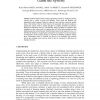Free Online Productivity Tools
i2Speak
i2Symbol
i2OCR
iTex2Img
iWeb2Print
iWeb2Shot
i2Type
iPdf2Split
iPdf2Merge
i2Bopomofo
i2Arabic
i2Style
i2Image
i2PDF
iLatex2Rtf
Sci2ools
132
click to vote
AIED
2005
Springer
2005
Springer
Do Performance Goals Lead Students to Game the System?
Students approach the learning opportunity offered by intelligent tutoring systems with a variety of goals and attitudes. These goals and attitudes can substantially affect students’ behavior within the tutor, and how much the student learns. One behavior that has been found to be associated with poorer learning is gaming the system, where a student attempts to complete problems and advance through an educational task by systematically taking advantage of properties and regularities in the system used to complete that task. It has been hypothesized that students game the system because of performance goals. In this paper, however, we find that the frequency of gaming the system does not correlate to a known measure of performance goals; instead, gaming is correlated to disliking computers and the tutor. Performance goals, by contrast, are shown to be associated with working slowly and avoiding errors, and are found to not be correlated to differences in learning outcomes.
Related Content
| Added | 26 Jun 2010 |
| Updated | 26 Jun 2010 |
| Type | Conference |
| Year | 2005 |
| Where | AIED |
| Authors | Ryan Shaun Baker, Ido Roll, Albert T. Corbett, Kenneth R. Koedinger |
Comments (0)

